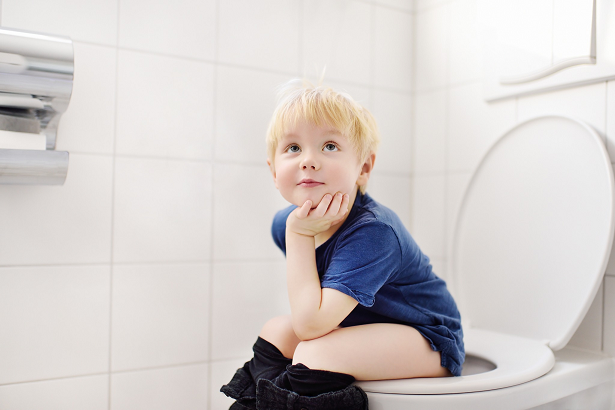Potty training is an important milestone for children and parents. Children develop more self-confidence and independence, and parents embrace the added mobility that comes without carrying supplies and changing diapers on the move. Read on to learn how you can help your little one be successful in potty training – and say hello to diaper-free days.
Gauging Readiness
 How can you tell if your child is ready for potty training? Are you as a family ready for potty training? Let your child tell you when to start. If they seem interested in the idea of going potty or start asking a lot of questions, this is an emotional key that they might be ready.
How can you tell if your child is ready for potty training? Are you as a family ready for potty training? Let your child tell you when to start. If they seem interested in the idea of going potty or start asking a lot of questions, this is an emotional key that they might be ready.
Twenty-seven months is the average age for potty training; however, anywhere from 18 months to 3 years is normal.
Your child may be ready if they can:
- Sit, walk and dress (with help)
- Pull pants up and down
- Understand and respond to two-step commands
- Control the muscles used for going to the potty
- Communicate bathroom needs
- Imitate others and demonstrate independence.
Setting up a Plan
When your child is ready to start training, consider these tips:
- Get a potty chair or potty seat (Pro tip: Buy a chair with their favorite character to keep them excited and engaged)
- Keep it positive – avoid punishment and taking anything away.
- Make going to the potty a part of your child’s daily routine, such as first thing in the morning, before leaving the house and after meals.
- Reward with small and large prizes, such as snacks or trinkets.
- Master daytime potty training before you worry about naps and nighttime.
Don’t Worry, Accidents Will Happen
Accidents are bound to occur, and they usually taper over a few months after potty training is generally complete. Bed-wetting may last longer and can affect children as old as age 6. If you run into more complex problems, such as resistance or refusal, consider taking time to reset for a week and switch back to diapers for a short period of time before restarting the process. Always remember, staying positive is key to successful potty training!
Learn more with Parenting U
Your child’s pediatrician is a great resource for questions on potty training. Children’s Nebraska offers a 100 percent virtual Parenting U video series covering popular topics such as Mastering Potty Training, Preparing for Your Newborn and Effective Timeout Techniques. Register here to learn expert advice and tips.
